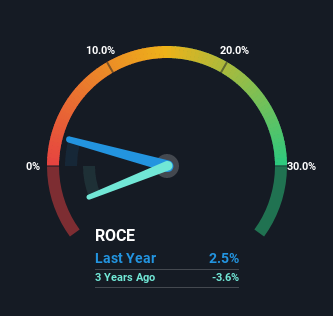- Malaysia
- /
- Construction
- /
- KLSE:BDB
Bina Darulaman Berhad's (KLSE:BDB) Returns On Capital Not Reflecting Well On The Business

Ignoring the stock price of a company, what are the underlying trends that tell us a business is past the growth phase? Businesses in decline often have two underlying trends, firstly, a declining return on capital employed (ROCE) and a declining base of capital employed. This indicates to us that the business is not only shrinking the size of its net assets, but its returns are falling as well. And from a first read, things don't look too good at Bina Darulaman Berhad (KLSE:BDB), so let's see why.
What Is Return On Capital Employed (ROCE)?
Just to clarify if you're unsure, ROCE is a metric for evaluating how much pre-tax income (in percentage terms) a company earns on the capital invested in its business. Analysts use this formula to calculate it for Bina Darulaman Berhad:
Return on Capital Employed = Earnings Before Interest and Tax (EBIT) ÷ (Total Assets - Current Liabilities)
0.025 = RM13m ÷ (RM698m - RM172m) (Based on the trailing twelve months to September 2022).
Thus, Bina Darulaman Berhad has an ROCE of 2.5%. Ultimately, that's a low return and it under-performs the Construction industry average of 5.3%.
View our latest analysis for Bina Darulaman Berhad

Historical performance is a great place to start when researching a stock so above you can see the gauge for Bina Darulaman Berhad's ROCE against it's prior returns. If you're interested in investigating Bina Darulaman Berhad's past further, check out this free graph of past earnings, revenue and cash flow.
How Are Returns Trending?
There is reason to be cautious about Bina Darulaman Berhad, given the returns are trending downwards. To be more specific, the ROCE was 9.0% five years ago, but since then it has dropped noticeably. And on the capital employed front, the business is utilizing roughly the same amount of capital as it was back then. Companies that exhibit these attributes tend to not be shrinking, but they can be mature and facing pressure on their margins from competition. If these trends continue, we wouldn't expect Bina Darulaman Berhad to turn into a multi-bagger.
In Conclusion...
In summary, it's unfortunate that Bina Darulaman Berhad is generating lower returns from the same amount of capital. Long term shareholders who've owned the stock over the last five years have experienced a 49% depreciation in their investment, so it appears the market might not like these trends either. With underlying trends that aren't great in these areas, we'd consider looking elsewhere.
If you'd like to know about the risks facing Bina Darulaman Berhad, we've discovered 2 warning signs that you should be aware of.
For those who like to invest in solid companies, check out this free list of companies with solid balance sheets and high returns on equity.
Valuation is complex, but we're here to simplify it.
Discover if Bina Darulaman Berhad might be undervalued or overvalued with our detailed analysis, featuring fair value estimates, potential risks, dividends, insider trades, and its financial condition.
Access Free AnalysisHave feedback on this article? Concerned about the content? Get in touch with us directly. Alternatively, email editorial-team (at) simplywallst.com.
This article by Simply Wall St is general in nature. We provide commentary based on historical data and analyst forecasts only using an unbiased methodology and our articles are not intended to be financial advice. It does not constitute a recommendation to buy or sell any stock, and does not take account of your objectives, or your financial situation. We aim to bring you long-term focused analysis driven by fundamental data. Note that our analysis may not factor in the latest price-sensitive company announcements or qualitative material. Simply Wall St has no position in any stocks mentioned.
About KLSE:BDB
Bina Darulaman Berhad
An investment holding company, engages in the oil palm plantation, property development, and management service businesses in Malaysia.
Excellent balance sheet low.
Market Insights
Community Narratives



